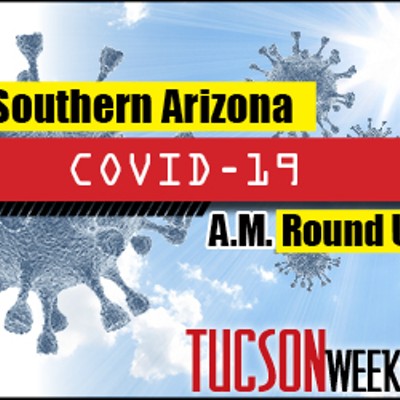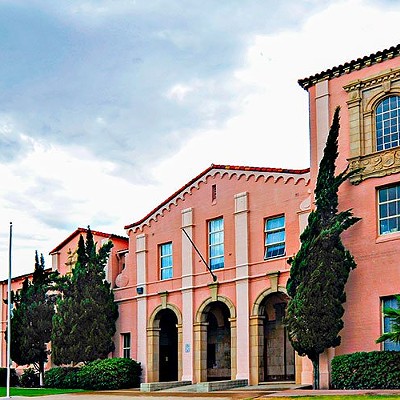He was confident. He was precise. He was excited. He was hopeful. He was grateful. And Stan Paz was humble.
One of eight children of a Morenci smelter worker, Paz was not afraid, when talking about the start and the turns in his high-performance education career, to call himself a "retread" when discussing the difficulty he and other teachers trained to teach Spanish had in landing jobs.
If so, he is a retread that is set to outperform all others.
TUSD, under the nine-year direction of outgoing Superintendent George F. Garcia, has made only slight gains in achievement at some schools. Others have been unable to break out of chronic poor scores.
It was his declaration about his "laserlike focus on student achievement," that resonated the most. He vowed to champion causes for students and to see that all can achieve their highest potential.
"Student achievement is the name of the game," Paz said.
He should know.
Paz, who is leaving a lucrative private sector position with Sylvan Learning Systems, Inc., was superintendent of the El Paso Independent School District--the fifth-largest school district in Texas--for more than seven years ending in 1998.
He led the 65,000-student El Paso system to reduce drop-out rates to their lowest level ever. Expulsions were actually eliminated in three years, an astonishing feat of programs Paz said were designed to make students productive. The real numbers were 1,500 expulsions to zero.
Paz made reversals in other areas as well. The district he inherited had eight schools that were ranked by Texas standards as "low-performance" schools. He also reduced that number to zero.
And Paz has been through what TUSD students, parents and teachers--as are most throughout Arizona--are struggling with: the AIMS test. Passage of the test will be mandatory for graduation in two years.
Even before his entry into the private sector, Paz developed links with business, community leaders and universities to boost his school district. The alliance was not unlike--at least on paper--those that Garcia participated in here. For Paz in El Paso, the work was created out of the need to rescue the school system. Indeed, there was a citywide crisis in education that undercut El Paso's economic profile.
Paz was a founder of the El Paso Collaborative for Academic Excellence that includes business, community leaders, the University of Texas-El Paso and the area's community college. And rather than the endless stream of intramural events and awards that have paralyzed similar groups in Tucson, the El Paso collaborative brought results with a standards-based curriculum and instruction program.
The program started with concentration on math and science but soon included reading. Paz is credited with tapping the energy of the collaborative to set standards in seven subject areas and to meld the curriculum with state and national standards. There were big increases in enrollment for algebra, geometry and science classes. In the space of four years, twice as many of the El Paso students passed the Texas version of AIMS, the Texas Academic Achievement Standards. The biggest gains were made in the Hispanic and African-American populations.
The same collaborative, with Paz's prodding, raised $25 million for El Paso schools.
Paz was joined at his press conference by Mary Belle McCorkle, president of the TUSD Board, and Rosalie Lopez, the board member who made the motion to hire Paz.
McCorkle, a onetime TUSD administrator who lost an internal political battle that led to her retirement, was one of Paz's bosses. She has high praise for Paz and her enthusiasm for him could not be contained when she needed to give him a big hug after introducing him.
The TUSD board spent about 12 hours, in interviews and deliberations, to reach its decision to choose Paz over the four other finalists. One candidate dropped out before the interview.
Lopez said she "felt when looking at the candidates there were to choose from that he was the one who was already well acclimated to the culture of Tucson and TUSD."
She said she was impressed by Paz's ideas, combining public education pedagogy with private sector experience, to arrest the drop-out rate while boosting achievement.
Different from his predecessor in both style and substance, Paz also suprised those at the press conference when Mike Gordy, the affable and energetic president of the Tucson Education Association, popped a question about commitment to teachers.
Not only did Paz give the right, reassuring answer, but he left the protection of the podium and went to Gordy to offer a handshake to confirm his commitment.
"Teachers are the program," Paz said.
Gordy was impressed.
And Paz has won support for his candor, explaining lessons he has learned from mistakes he's made such as the bad timing of some personnel decisions in El Paso that caused some backlash.
Paz, 51, earned his bachelor's degree in secondary education from the University of Arizona in 1970. He received his master's in elementary education also from the UA in 1975 and his doctorate in educational administration from the UA in 1980.
His connection to youth reaches beyond the classroom and the administrator's office. After getting his master's, he worked as probation officer at the Pima County Juvenile Center. From there, Paz taught in TUSD at Drachman Elementary and at Spring, Safford and Wakefield junior high schools. He then moved to the UA where he taught bilingual Education and Foundations of Education in the College of Education. He returned to TUSD in 1980 as director of state and federal programs before becoming director of Bilingual Education the following year. He was promoted to deputy superintendent and served in that job from 1985 until 1988, when he took a similar job with the Dallas Independent School District. He joined Sylvan last year and has been the vice president for the Southwest region. He also was picked by a former TUSD superintendent, Paul Houston, executive director of the American Association of School Administrators, to work for a component of that organization.
Paz's salary has not been set. But his total compensation package--salary, benefits, expenses--will not exceed $200,000. Garcia is costing taxpayers more than $144,000 a year.












